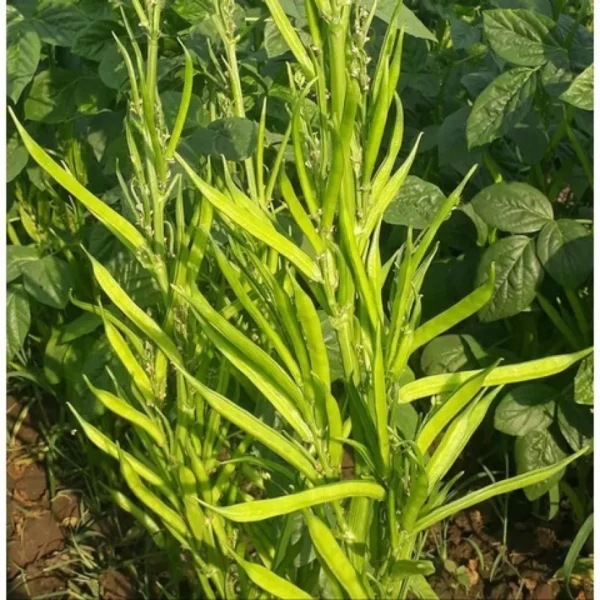Black nightshade manathakkali keerai leafy vegetable seeds
Black nightshade manathakkali keerai leafy vegetable seeds
Quantity: 2 grams (100+ seeds)
Black nightshade, known scientifically as Solanum nigrum, is a plant with a long history of use in traditional medicine and cuisine, particularly in India. Its ripe berries and cooked leaves are edible and nutritious.
Black nightshade manathakkali keerai leafy vegetable seeds
Black nightshade manathakkali keerai leafy vegetable seeds
Black nightshade, known scientifically as Solanum nigrum, is a plant with a long history of use in traditional medicine and cuisine, particularly in India. While the plant has some toxic parts, its ripe berries and cooked leaves are edible and nutritious.
Characteristics
Appearance: Black nightshade is a bushy annual or short-lived perennial plant that grows up to 1 meter in height. It has oval, slightly toothed leaves and small, star-shaped white or purple flowers.
Berries: The plant produces small, shiny black berries when ripe, which are typically 5-10 mm in diameter.
Growth Habit: It has a branching habit and can spread widely if not controlled.
Nutritional Benefits Vitamins and Minerals: Rich in vitamins A and C, and contains essential minerals like calcium, phosphorus, and iron.
Antioxidants: Contains antioxidants such as flavonoids, which help protect the body from oxidative stress.
Protein: Provides a moderate amount of plant-based protein.
Growing Conditions
Climate: Black nightshade manathakkali keerai leafy vegetable seeds thrives in warm climates but can adapt to various conditions. It grows well in temperatures ranging from 20°C to 30°C.
Soil: Prefers well-drained, fertile soil with a pH between 5.5 and 7.5. It can tolerate poor soil conditions but flourishes with organic matter.
Water: Requires regular watering, especially during dry spells, but should not be waterlogged.
Propagation and Planting Seeds: Propagated through Black nightshade manathakkali keerai leafy vegetable seeds, which are small and can be directly sown in the garden or started in seed trays.
Germination: Black nightshade manathakkali keerai leafy vegetable seedstypically germinate within 10-14 days under optimal conditions.
Spacing: Space plants about 30-45 cm apart to allow sufficient growth and airflow.
Cultivation Practices
Transplanting: Seedlings can be transplanted when they have 2-3 true leaves. Weeding: Regular weeding is essential to reduce competition for nutrients and water.
Mulching: Apply organic mulch to retain soil moisture and suppress weeds. Fertilization: Use a balanced fertilizer or compost to provide essential nutrients throughout the growing season.
Harvesting Leaves: Leaves can be harvested once the plant reaches a sufficient size. Younger leaves are preferred for their tenderness and flavor.
Berries: Berries are harvested when fully ripe and black. Unripe berries and other parts of the plant can be toxic and should be avoided.
Culinary Uses Leaves: Cooked leaves are used in a variety of dishes, often in curries, soups, and stews. They must be boiled or cooked to remove any potential toxins.
Berries: Ripe berries are sometimes used in traditional recipes and can be eaten raw or cooked. They are also used to make jams and desserts in some cultures.
Health Benefits Anti-Inflammatory: The plant has anti-inflammatory properties due to its bioactive compounds. Digestive Health: Leaves are high in fiber, which aids digestion and promotes gut health.
Antioxidant Properties: Antioxidants in the plant help in protecting cells from damage caused by free radicals.
Traditional Medicine Uses: Black nightshade has been used in traditional medicine to treat a variety of ailments, including skin conditions, ulcers, and fever. However, due to its potential toxicity, it should be used with caution and under guidance.
Environmental Impact Soil Health: Can improve soil health by adding organic matter. It is often found growing wild in nutrient-rich soils
Biodiversity: Attracts beneficial insects and contributes to garden biodiversity.
Summary
Black nightshade is a versatile plant with significant nutritional and medicinal value. It can be easily grown in a variety of climates and soil conditions, making it a common plant in many regions, including India.
Its leaves and ripe berries, when properly prepared, offer a range of culinary uses and health benefits. However, due to its potential toxicity, it is essential to handle and consume black nightshade with care.
Black nightshade manathakkali keerai leafy vegetable seeds
| Weight | 20 g |
|---|---|
| Dimensions | 11 × 8.5 × 11 cm |







Reviews
There are no reviews yet.